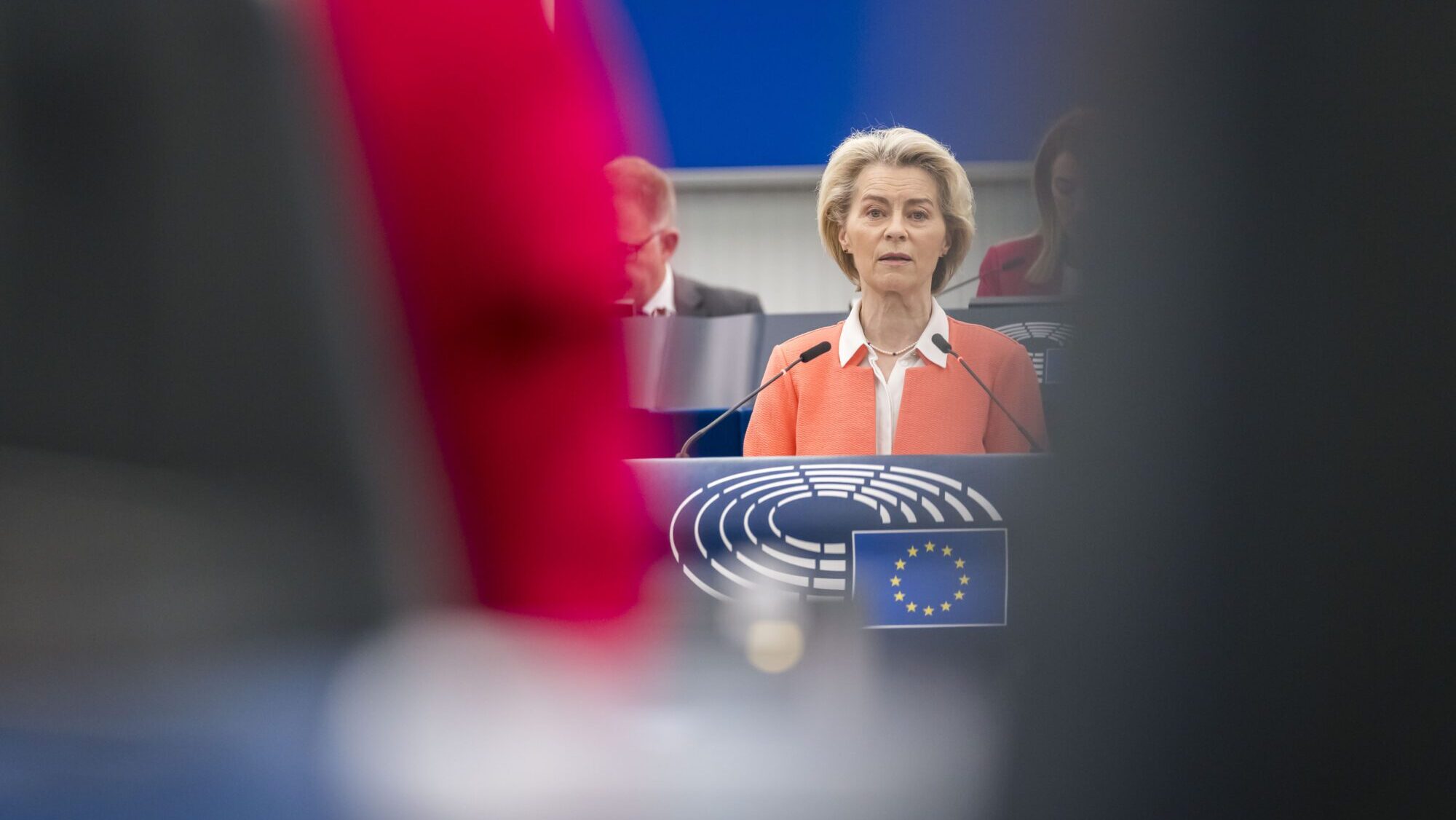
Photo: Daina Le Lardic © European Union 2024 – Source : EP
The European parliamentary group Identity and Democracy (ID), whose members include anti-globalist parties such as the German AfD, the French Rassemblement National, and the Italian Lega, gathered in Rome for a convention on Saturday, March 23rd. On this occasion, Marine Le Pen for RN and Matteo Salvini for Lega reaffirmed their refusal to support a new mandate for Ursula von der Leyen as head of the European Commission and urged Italian Prime Minister Giorgia Meloni to do the same—despite the fact that Meloni cultivates a privileged relationship with the EPP from which von der Leyen comes.
During the convention, Marine Le Pen broadcast a very stark video message to Giorgia Meloni, playing up the proximity and familiarity with the Italian leader: “I have a real question for the Italian Prime Minister: Prime Minister, will you or will you not support a second term of office for Mrs von der Leyen?” she asks insistently, demanding “the truth” for the Italian people.
In the video, the former RN President takes the opportunity to pay a glowing tribute to her long-standing ally Salvini, whom she describes as the only right-wing candidate in Italy willing to oppose Ursula von der Leyen. This view was shared by André Ventura, president of the Portuguese national right-wing movement Chega, who was also in Rome, and who praised Salvini as “the only politician who defends all the nations of Europe.”
The unanimity displayed within the Identity and Democracy group against Ursula von der Leyen is in stark contrast to the ECR group, the other right-wing parliamentary group in the European Parliament.
The ECR group brings together 17 nationalities and the parties that make up the group do not all have the same strategy with regard to the senior German civil servant. Poland, represented in the group by the Law and Justice party (PiS), does not want to hear of any support for von der Leyen, while Fratelli d’Italia, Giorgia Meloni’s party, wants her to guarantee the allocation of recovery plan funds to Italy and, in the medium term, the appointment of the next Italian European Commissioner.
On the other hand, the rejection of Ursula von der Leyen is a common thread that unites the three rival parties of the French right: Éric Zemmour’s Reconquête party, Les Républicains, and Rassemblement National.
The Reconquête party, which announced that it would join the ECR group if it passed the 5% mark, made it very clear that it would not support a second term for the Commission president. Marion Maréchal, head of the list, explained that their aim was to “topple von der Leyen’s centre-left majority.”
The Les Républicains party, a member of the EPP parliamentary group and represented by François-Xavier Bellamy as head of the list for the forthcoming elections, is no different, and the French delegation has announced that it will not vote for the renewal of Ursula von der Leyen’s term of office. This convergence of views between the three French parties contrasts with the dissension on the subject that is agitating the right-wing coalition in power in Italy.
At the convention in Rome, having let Marine Le Pen do the hard job, Matteo Salvini was keen to play down the differences between his party and that of Prime Minister Meloni. He reaffirmed the solidity of the government, which “will continue until 2027,” saying that “among friends, there can be different points of view.” Salvini has also sought to play down Le Pen’s remarks, explaining that he had not been able to reread her speech beforehand.
Unsurprisingly, the message was not received very favourably by Meloni’s side. Carlo Fidanza, head of the Fratelli d’Italia delegation in Brussels, explained in an interview with the newspaper La Stampa: “Giorgia has always said that she doesn’t accept it when a foreign politician tells her what to do. That applies to the Left, whose interference we are unfortunately used to. But it also applies, and I would say even more so, to the Right.”
Fidanza reiterated that Fratelli d’Italia’s positions are primarily guided by concrete political needs and pointed out that his party had not voted in favour of Ursula von der Leyen in 2019—without confirming that Fratelli d’Italia would take the same stance in 2024.
The personal response of Meloni, who sees the hand of Matteo Salvini in Marine Le Pen’s provocation, consisted of dodging the issue: “The problem is not the president of the Commission, the problem is the majority that supports the president, because it is this majority that decides policy in Europe,” she said. The important thing, according to her, is to achieve “a centre-right majority” within the European Parliament—even at the cost of a possible compromise with Ursula von der Leyen.
